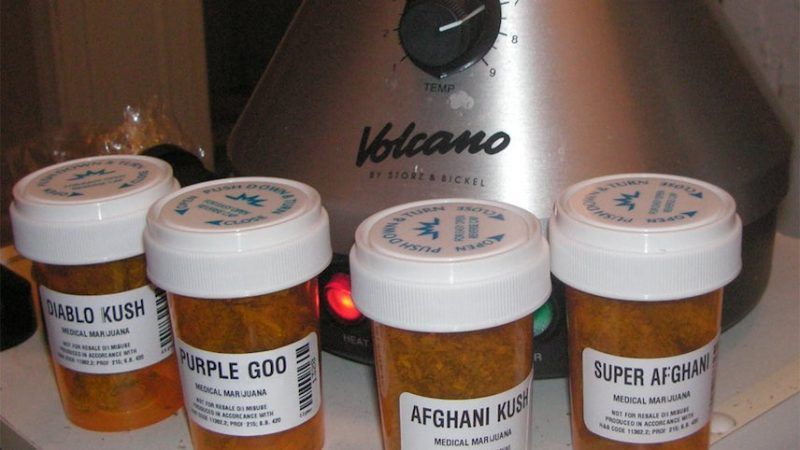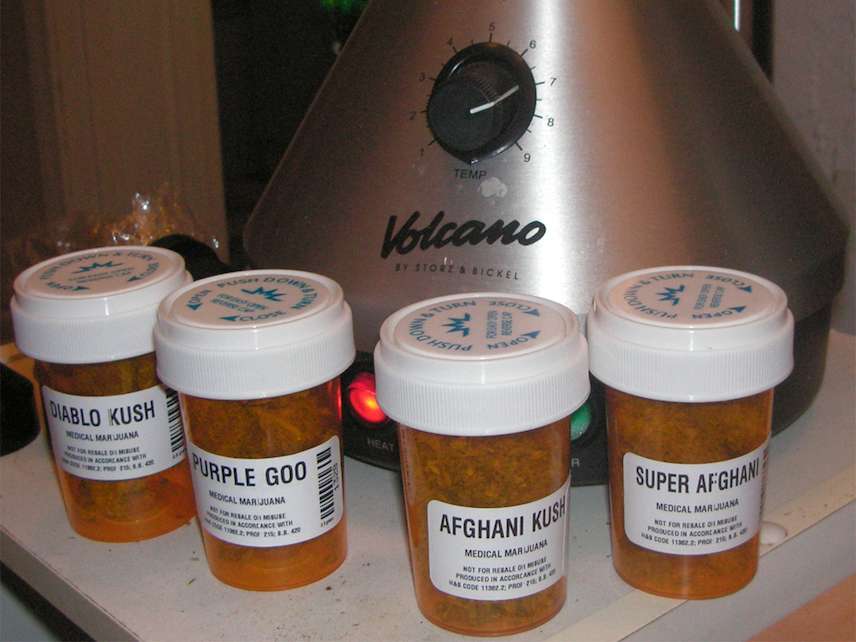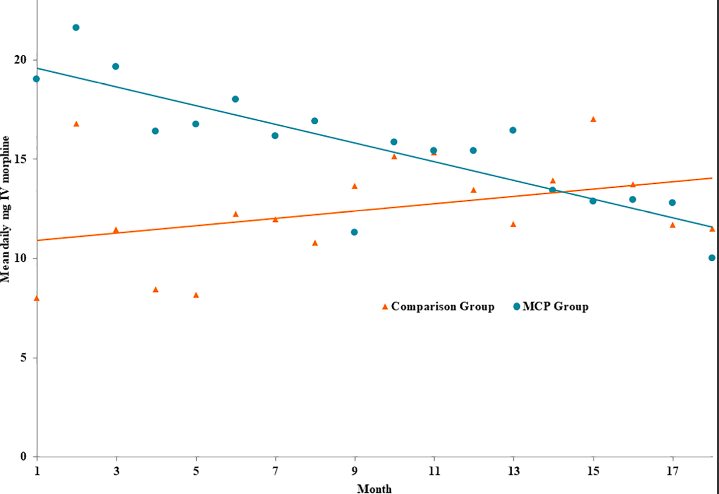New Mexico Study Suggests Medical Cannabis Helps Chronic Pain Patients Reduce Opioid Use
Yet another cohort study finds a correlation between medical marijuana and reduced reliance on opioids.


Chronic pain patients who enroll in New Mexico's Medical Cannabis Program while using prescription opioids are likely to reduce their dosage of opioids and even to cease using opioids altogether, according to a new study from researchers at the University of New Mexico.
Participants in the program also reported "improvements in pain reduction, quality of life, social life, activity levels, and concentration, and few side effects from using cannabis one year after enrollment in the MCP."
Published earlier this month in the open access journal PLOS One, the study had a small sample size: 37 of the surveyed patients enrolled in the marijuana program, while 29 used opioids alone. The study also relied on a cohort model rather than a randomized control trial. That means investigators had no say over who ended up in the comparison group versus the Medical Cannabis Program (MCP) group.

The UNM researchers concluded the "clinically and statistically significant evidence of an association between MCP enrollment and opioid prescription cessation and reductions and improved quality of life warrants further investigations." That finding dovetails neatly with a growing body of research that medical marijuana works as well as some prescription drugs for the treatment of pain, while imposing fewer side effects on users.
Researchers at the University of Michigan, for instance, reported in 2016 that chronic pain patients participating in Michigan's medical marijuana program reported a large reduction in opioid use and improved quality of life. Other studies have found that doctors in medical marijuana states prescribe fewer prescription drugs, and that states with legal medical marijuana have experienced a smaller increase in opioid overdose rates compared to states where medical marijuana is not legal.
Albert Einstein College of Medicine announced earlier this year it had received a $3.5 million grant from the National Institute of Health to conduct a five-year study on medical marijuana's potential to reduce opioid use in patients with chronic pain.
The more of these studies I see, the more I'm reminded of something psychiatrist Scott Alexander noted about the renaissance in psychedelic research: "There's a morality tale to be told here about how the War on Drugs choked off vital research on some of the most powerful psychiatric compounds and cost us fifty years in exploring these effects and treating patients." Marijuana's schedule I status precluded it from competing with prescription opioids in the early 1990s as a treatment for chronic pain. That it remains in schedule I, despite a procession of state-level reforms, precludes today's medical professionals and patients from using it the way they use far more potent drugs.
I'm not convinced we need marijuana to be a perfect substitute for prescription opioids, but it seems pretty obvious that chronic pain patients—like PTSD and anxiety patients who want to try MDMA, or depression patients who wish to try psilocybin—would benefit from a wider range of legal drug options than they currently have.
Editor's Note: As of February 29, 2024, commenting privileges on reason.com posts are limited to Reason Plus subscribers. Past commenters are grandfathered in for a temporary period. Subscribe here to preserve your ability to comment. Your Reason Plus subscription also gives you an ad-free version of reason.com, along with full access to the digital edition and archives of Reason magazine. We request that comments be civil and on-topic. We do not moderate or assume any responsibility for comments, which are owned by the readers who post them. Comments do not represent the views of reason.com or Reason Foundation. We reserve the right to delete any comment and ban commenters for any reason at any time. Comments may only be edited within 5 minutes of posting. Report abuses.
Please to post comments


It's hard to maintain your opioid addiction when you're in prison for marijuana possession.
No it's not there are more drugs in prison than out.
Why does the MCP group start at nearly double the average opoid prescription level of the control group? That seems like an unfair comparison, and you can view the results of the higher group gradually resolving the average.
That's weird.
That struck me too. Looks like the result could be mere regression to the mean.
I can think of a reason the MCP group started out using more morphine: Because they were in more pain, which is why they wanted to try cannabis in addition.
Yeah, that regression to the mean thing bothers me. There are plenty of things that could make this valid, off the top of my head those amounts of morphine could both be completely normal. Like if a standard does is 10-100mg than we might just be seeing a statistical quirk, with the chart having too few data points to show broader behavior.
But on face value it looks suspicious.
I always hate these pragmatic arguments for legalization anyway though.
I fucking love pragmatic arguments like this for any advance in liberty. Because everything else is just, "Liberty is always better per se," vs., "No, it's not."
My reasoning is, at the core of it's being, ethical. My question I always ask is how can we tell another person what to do with their bodies? There are times this becomes difficult to resolve, abortion I think is hard, as well as other things related to people interacting with some force.
Cases like this are easy. It does not matter if it is "better" in some grand societal scheme. The only person who should have to decide is that individual. That's how I come to it though.
Pragmatic things like this have nice value outside of my political arguments though.
"The study also relied on a cohort model rather than a randomized control trial. That means investigators had no say over who ended up in the comparison group versus the Medical Cannabis Program (MCP) group."
Looks like they weren't in control of the test pools.
They weren't, but in such a case they usually try to do matching for comparison. In this case I'd have to figure they were using some other criterion for matching, but the great disparity in dosage of morphine at the start is at least a strong confounder, wouldn't you say?
Oh, sure. But I was just pointing out why the test was done this way, not justifying it per se.
Also, if that's a line of best fit and the individual dots are the actual recorded mean for each month that means that 4 out of the 17 months on record (23% of the data points) the control group had average usage below ANY month for the MCP group.
Also, the average consumption over the entire time period for the control group is lower than almost any month for the MCP group, which really makes it seem like they started with a high consumption group with a regression towards an average.
I need to save this and read it later, because I must be interpreting that graph incorrectly.
Albert Einstein College of Medicine announced earlier this year it had received a $3.5 million grant from the National Institute of Health to conduct a five-year study on medical marijuana's potential to reduce opioid use in patients with chronic pain.
If you name your institution after Al Einstein, it makes it seems smarter.
The question is what does Einstein have to do with medicine?
Einstein endorsed a certain brand of socialism, and socialism controls government which in turn nationalizes the practice of medicine. So it's all relative.
I think he gave $ to Yeshiva U. to found AECOM.
Moss Rehab in Elkins Park (just outside Phila.) is on the grounds of another medical institution named Albert Einstein.
So, in a sense, they honored him for his writing...he wrote a check.
(old joke)
I've never found it to be effective for pain. I had a kidney stone a month ago and trust me it didn't do crap for the pain.
I'm sorry to hear that. Ouch.
I went to the doctor to get a permission slip from government so I could smoke some marijuana.
The doctor said "This permission slip to smoke marijuana needs to have a valid illness that the marijuana may cure.
I told the doctor "OK, I'm depressed."
The doctor said "What's causing your depression?"
I replied "The government."
The doctor said "That's interesting, I've never heard that one before. Please go on."
"Well sir," I replied "I'm depressed that I would even need a government permission slip to smoke something that I chose. I take full responsibility for my actions and I harm no one."
The doctor replied "Sir, that's a very valid reason. Here is your government permission slip with the reason being "Depressed by government. OK to smoke marijuana."
Top Kek!
Soo... Exit Sign Drug, then?
Vital marijuana research was forbidden for many decades. Cops, prosecutors, law makers, judges were having good sport destroying peoples lives by making criminals out of them. My fantasy is that these bad guys will be punished. The simpletons, they call themselves the 99%, believe that current marijuana reforms proves that our system works.
The drug war crimes tribunal, erected with irony aforethought in Nuremberg, PA, will be glorious.
20 woodchippers, no waiting.
On the contrary, foreplay is essential to an enjoyable experience.
But after the Drug War is over, it will be hard to find anyone who admits to supporting it. Think post Jim Crow, post-Prohibition, etc.
They will explain they only gave lip service to the policy in question while ameliorating its effects...there will be so many people explaining they were never really in favor of the old policy you'll wonder how it got enacted and enforced in the first place.
No one ever said that the show trials actually had to find "truth" or any nonsense like that. That defeats the whole purpose of the endeavor.
Well duh! Religious communists like William Jennings Bryan, Edward Bellamy and William Dean Howells shrieked for a ban on beer AND a C. Manifesto federal income tax all in the same breath. Their Frankenstein monster by 1930 had created a dry killer kleptocracy here and a mass-genocide Soviet over there. So the 18th amendment was watered-down but the 16th continued to strangle recovery in the crib. Looter politicians, disappointed at the shortage of beer tax revenues added Jim Crow prohibition of harmless plants. That these plants never competed with beer and heroin BEFORE beer became a felony and the Harrison act turned physicians into snitches is not the sort of thing polite people bring up. So let's change the subject.
Well duh! Religious communists like William Jennings Bryan, Edward Bellamy and William Dean Howells shrieked for a ban on beer AND a C. Manifesto federal income tax all in the same breath. Their Frankenstein monster by 1930 had created a dry killer kleptocracy here and a mass-genocide Soviet over there. So the 18th amendment was watered-down but the 16th continued to strangle recovery in the crib. Looter politicians, disappointed at the shortage of beer tax revenues added Jim Crow prohibition of harmless plants. That these plants never competed with beer and heroin BEFORE beer became a felony and the Harrison act turned physicians into snitches is not the sort of thing polite people bring up. So let's change the subject.
http://www.miaminewtimes.com/n.....is-9863118
Which one of you perverts is this?
"He says he has three daughters and a young son and clarifies that he does not hump mannequins."
This is the kind of clarifying statement political consultants and entertainment industry people have to make all the time.
Alternate joke
I'm not sure what's more offensive: that you believe we would debase ourselves with such immaturity or that you think we might be working for Rick Scott.
I'm not convinced we need marijuana to be a perfect substitute for prescription opioids
Weed's not a substitute at all. However, tt does produce a great synergistic effect.
Why is every patient studied on 22mg or less IV-equivalent morphine? That's a tiny dose for people with minor pain for only a few months, not major long term pain. Does the study clarify that? It sounds almost as bad as that study that was being passed around to show opiates weren't more effective than NSAIDs in the ER, when it only showed that 5mg of hydrocodone or oxycodone wasn't (a dose so small it's a wonder it beat placebo, although that wasn't tested). It smacked of propaganda in furtherance of a policy of restricting opiates so much they're not medically useful as a precursor to banning them entirely for not being justified.
Sometimes people end up falling into addiction from relatively small "officially prescribed" doses. (Then again, Reason should know better than anyone how much rarer that actually is in real life compared to media scaremongering).
Everything is better with a bag of weed
We are suppliers of pain Killers and Anti Anxiety pills, Medical Marijuana and seeds. Hash, Rick Simpson .
LSD, Nembutal, MDMA..etc
email :discreetsales2015(AT)gmail(.)com or Text +1 (7244700553